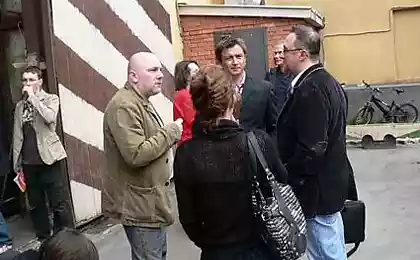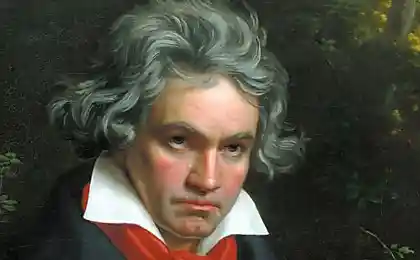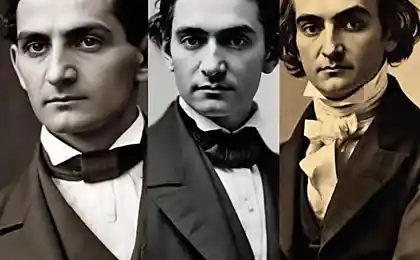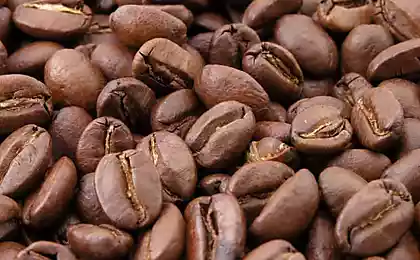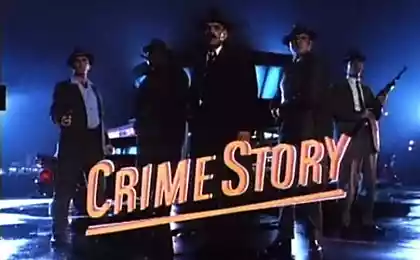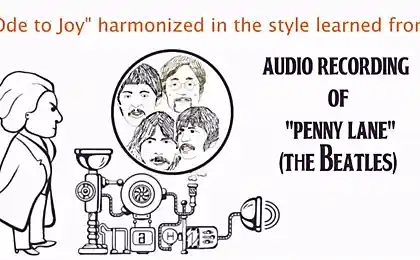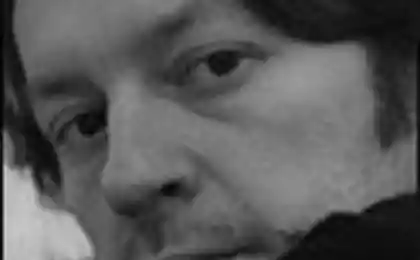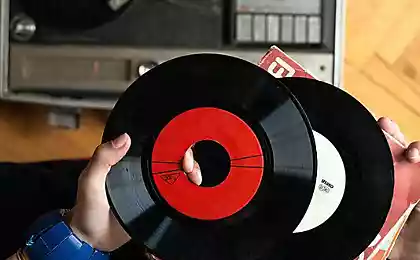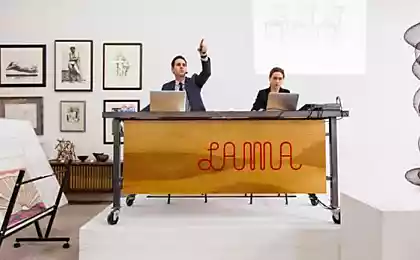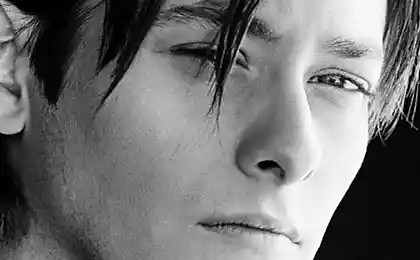473
How to learn to understand the music of Beethoven
May 24, in Svetlanovsky hall MMDM will take place the concert "Metabetchouan", dedicated to the 255-th anniversary of the birth of Ludwig van Beethoven. Ilya Ovchinnikov explained what the greatness of the music of German composer and why should begin to learn to understand it.
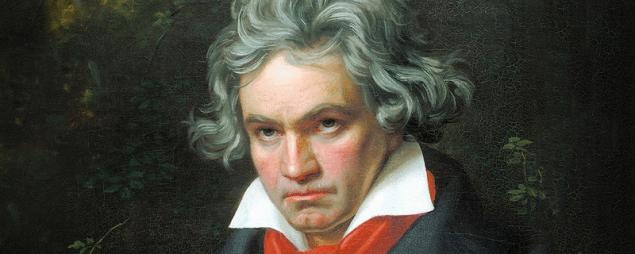
Photo: wikipedia.org
"Inhuman music"
On the one hand, by Ludwig van Beethoven (1770-1827) seems to be clear: who has not heard the Fifth Symphony ("fate knocking"), the finale of the Ninth (the anthem of the European Union and one of the most popular ringtones), "Moonlight Sonata", one knows that by the end of his life the composer was deaf? Lenin called his "Appassionata" "what astonishing, superhuman music." How Beethoven became part of the collective unconscious, says well-known Internet bike, believable in its absurdity. A political officer, staged a concert for the anniversary of Lenin, ordered the musicians of his part to perform "Moonlight Sonata". Found three accordion, drum plate, monophonic synthesizer, gathered the choir was invited by the bosses. Listening to "Moonlight Sonata" performed such a powerful composition, the brass was trying not to laugh, not yet appeared the reader with the words: "What superhuman music!" Such could not happen, neither Bach nor Mozart nor Vivaldi, not Tchaikovsky, another jubilee this year.
On the other hand, of those the Fifth and Ninth symphonies on hearing only the most famous themes, brilliant Seventh know already less and sonatas or quartets — even worse. The farther from a genuine Beethoven's representation of him as an author of something loud and bombastic. Although Beethoven most frequently performed composers in the world, his sense of confusion and the musicians. Not by accident these days with a break in just a week in Moscow — two programs whose authors tend to hear Beethoven in a new way. Just at the Conservatoire had played a "Heroic" Symphony, arranged for Quartet. And on may 24 at the House of music — program", Metabetchouan", where fragments of his compositions will be performed surrounded by the music of our contemporaries, inspired by Beethoven. It will be presented by violinist Elena Revich and pianist Polina Osetinskaya and artists Persimfans orchestra without a conductor. This concert is dedicated to a brief guide to the composer's music.
"Intractable"
Classics are always attracted to rock musicians, and not surprisingly, guitarist Ritchie Blackmore, gathered a new band Rainbow, decided to strengthen its new album, win-win "Ode to joy". The album "Difficult to Cure" (1981) was crowned with the same composition, representing a vigorous treatment of the famous Beethoven melodies. However, in Deep Purple, Blackmore had done with the legacy of Beethoven a lot more gracefully, I opened up one of the songs from the album "The Book of Taliesyn" as follows:
Even if you are far from the world of classical music, you will surely be happy to hear this melody in the Allegretto of Beethoven's Seventh Symphony. The premiere was held in 1813 in Vienna under the baton of the composer, at a concert in favor of the warriors with disabilities. For the first time sounded Beethoven's"Wellington's Victory, or the Battle of Vittoria" — today few people know her, and then with the success of "Victory" Seventh gone unnoticed. Although many contemporaries appreciated it, there were those who believed that such music could only write a drunkard or a patient of a madhouse. Of the four movements of the Symphony the most famous, though others are not less beautiful.
Listen to a fragment from the 14th minute
"Too fat"
Listen to a fragment from the 37th minute
It is unlikely that you thought about the fact that the violin concertos several times smaller than the piano. Judge for yourself how many concertos for piano and violin with orchestra, respectively composed by other great composers: Brahms (2 and 1), Tchaikovsky (3 and 1), Mozart (27 and 5). The percentage is close to Mozart, Beethoven: he created five piano concertos and one violin, but what! Forget everything you have heard about the heaviness of the Beethoven symphonies, this concert is like talking with you personally, and pomposity in him there is no shadow. However, in this case, a particularly important artist, who will be able to convey this fragility: perhaps the best of all his plays Patricia Kopachinskaya. "This concert has already become like an old man — too fat, too heroic, which has little in common with the spirit of the music. Here is a simple and catchy melody, and tempo have to be fast March, although playing it very slowly. But there are rates specified according to Beethoven, and they are much faster than normal. The violin is like a bird flying over the orchestra." If you get bored in the middle, you will be rewarded in the finals: he will give you such a beautiful and sad tune that you'll barely keep from grateful tears.
No one will hear
In Beethoven's sonatas for various instruments remains practically the same unjust imbalance: a five — for cello and piano, ten for violin and piano, thirty two piano solos. However, Russian-American conductor and composer Nicholas Slonimsky recalls how his friend Enna Lockwood summoned at a seance the spirit of Beethoven, who played his posthumous Sonata No. 33. Lockwood was shocked by the modernist sound of the Sonata and even recorded it on tape, and firmly promising the author that the recording no one will hear. With the inaccessibility of the Thirty-third we have to choose from thirty-two, one will prefer the latter, with its original two-part form; the other is the Sonata the "Hammerklavier", Adagio which in itself is a masterpiece; the third is "pathetic" because she once played Jethro Tull; the fourth to the Twentieth that is not hard to learn on their own to those who finished music school. Even on this gorgeous background is the fifteenth of its Andante has no parallel in Beethoven's music. If you are still in doubt about whether the composer has a sense of humor, listen to this piece performed by Glenn Gould. Many pianists play it slowly and sadly, and Gould clearly trumps Paphos, only slightly speeding up the pace.
Reluctance to part
Listen to a fragment from 16 minutes
Sonatas for violin and piano Beethoven's only ten, but choose one of them for a first acquaintance is also difficult. Eighth, with its incredible simplicity, available in the records of the great Sergei Rachmaninoff and Fritz Kreisler? "Kreutzer", gave its name to the famous novel of Leo Tolstoy and a string Quartet by leoš janáček, which is the same Kopachinskaya plays with a real rock drive? Fourth, with her sad, as if pleading tone, surprising for Beethoven? The last Tenth, it is better that seem to write impossible? No, still Seventh. First, among the ten is one of only two written in a minor key, and minor stronger takes the soul. Second, for the generosity in most of the violin sonatas by Beethoven in three parts, and the Seventh could be the end of the Scherzo. However, beyond that the composer gives us a great finale, giving the Sonata a wonderful new dimension.
The fee for four
Listen to a fragment from the 11-th minute
"You should be happy that they are playing good music with good musicians and get some more money! Believe me, soon the time will come when for the right to play good music you have to pay extra for yourself!" — presciently told a young colleague Vasily Shirinsky, second violinist of the Beethoven Quartet, one of the best chamber ensembles of the USSR. "The impresario considered that the fees, who gets a Quartet comparable to the fees of the soloists. However, in group four, and the amount remains almost the same," — agreed with him and Valentin Berlinsky, founder of the equally famous Borodin Quartet. Anyway, a string Quartet — two violins, a viola and a cello — the most exquisite and subtle, complex and interesting form of music-making. You can listen to not too successfully performed the Symphony — and to the fun of playing of the orchestra; Quartet for any failure a hundred times more noticeable. The late quartets of Beethoven — one of the peaks of a Quartet of art. Before that, the composer did not write quartets for almost fifteen years, pausing after a brilliant Quartet in f minor, subtitled "Serioso" — "Serious". Despite the brevity, it is incredibly rich in musical ideas and changes of mood, especially the fast part, the tone which without stops is torn between interrogative and affirmative.
Without coughing and whispering
Listen to a fragment from the 11-th minute
Unfortunately, the audience we are not accustomed to silence; conductor Vladimir Jurowski is one of the few of our musicians, who do not begin the concert until hall won't stop talking and flipping programs. The fourth piano Concerto of Beethoven in this sense, special essay: the first ever concert soloist begins without an orchestra, in complete silence, which is so hard to wait for our public. However, if you're lucky and you happen to hear the beginning without the background cough and whisper, you have captured the spirit and from the soft piano chords, and a soft support band. Fans of the concert are divided into two big groups: some people believe that Beethoven would have to be limited to the first part (it lasts about 20 minutes), others that the second and third (15 minutes total). If you enjoy the whole concert and you decide not to join any of the groups, you can consider yourself a true connoisseur of Beethoven. Published
P. S. And remember, just changing your mind - together we change the world! ©
Source: vozduh.afisha.ru/music/kak-nauchitsya-ponimat-muzyku-bethovena/

Photo: wikipedia.org
"Inhuman music"
On the one hand, by Ludwig van Beethoven (1770-1827) seems to be clear: who has not heard the Fifth Symphony ("fate knocking"), the finale of the Ninth (the anthem of the European Union and one of the most popular ringtones), "Moonlight Sonata", one knows that by the end of his life the composer was deaf? Lenin called his "Appassionata" "what astonishing, superhuman music." How Beethoven became part of the collective unconscious, says well-known Internet bike, believable in its absurdity. A political officer, staged a concert for the anniversary of Lenin, ordered the musicians of his part to perform "Moonlight Sonata". Found three accordion, drum plate, monophonic synthesizer, gathered the choir was invited by the bosses. Listening to "Moonlight Sonata" performed such a powerful composition, the brass was trying not to laugh, not yet appeared the reader with the words: "What superhuman music!" Such could not happen, neither Bach nor Mozart nor Vivaldi, not Tchaikovsky, another jubilee this year.
On the other hand, of those the Fifth and Ninth symphonies on hearing only the most famous themes, brilliant Seventh know already less and sonatas or quartets — even worse. The farther from a genuine Beethoven's representation of him as an author of something loud and bombastic. Although Beethoven most frequently performed composers in the world, his sense of confusion and the musicians. Not by accident these days with a break in just a week in Moscow — two programs whose authors tend to hear Beethoven in a new way. Just at the Conservatoire had played a "Heroic" Symphony, arranged for Quartet. And on may 24 at the House of music — program", Metabetchouan", where fragments of his compositions will be performed surrounded by the music of our contemporaries, inspired by Beethoven. It will be presented by violinist Elena Revich and pianist Polina Osetinskaya and artists Persimfans orchestra without a conductor. This concert is dedicated to a brief guide to the composer's music.
"Intractable"
Classics are always attracted to rock musicians, and not surprisingly, guitarist Ritchie Blackmore, gathered a new band Rainbow, decided to strengthen its new album, win-win "Ode to joy". The album "Difficult to Cure" (1981) was crowned with the same composition, representing a vigorous treatment of the famous Beethoven melodies. However, in Deep Purple, Blackmore had done with the legacy of Beethoven a lot more gracefully, I opened up one of the songs from the album "The Book of Taliesyn" as follows:
Even if you are far from the world of classical music, you will surely be happy to hear this melody in the Allegretto of Beethoven's Seventh Symphony. The premiere was held in 1813 in Vienna under the baton of the composer, at a concert in favor of the warriors with disabilities. For the first time sounded Beethoven's"Wellington's Victory, or the Battle of Vittoria" — today few people know her, and then with the success of "Victory" Seventh gone unnoticed. Although many contemporaries appreciated it, there were those who believed that such music could only write a drunkard or a patient of a madhouse. Of the four movements of the Symphony the most famous, though others are not less beautiful.
Listen to a fragment from the 14th minute
"Too fat"
Listen to a fragment from the 37th minute
It is unlikely that you thought about the fact that the violin concertos several times smaller than the piano. Judge for yourself how many concertos for piano and violin with orchestra, respectively composed by other great composers: Brahms (2 and 1), Tchaikovsky (3 and 1), Mozart (27 and 5). The percentage is close to Mozart, Beethoven: he created five piano concertos and one violin, but what! Forget everything you have heard about the heaviness of the Beethoven symphonies, this concert is like talking with you personally, and pomposity in him there is no shadow. However, in this case, a particularly important artist, who will be able to convey this fragility: perhaps the best of all his plays Patricia Kopachinskaya. "This concert has already become like an old man — too fat, too heroic, which has little in common with the spirit of the music. Here is a simple and catchy melody, and tempo have to be fast March, although playing it very slowly. But there are rates specified according to Beethoven, and they are much faster than normal. The violin is like a bird flying over the orchestra." If you get bored in the middle, you will be rewarded in the finals: he will give you such a beautiful and sad tune that you'll barely keep from grateful tears.
No one will hear
In Beethoven's sonatas for various instruments remains practically the same unjust imbalance: a five — for cello and piano, ten for violin and piano, thirty two piano solos. However, Russian-American conductor and composer Nicholas Slonimsky recalls how his friend Enna Lockwood summoned at a seance the spirit of Beethoven, who played his posthumous Sonata No. 33. Lockwood was shocked by the modernist sound of the Sonata and even recorded it on tape, and firmly promising the author that the recording no one will hear. With the inaccessibility of the Thirty-third we have to choose from thirty-two, one will prefer the latter, with its original two-part form; the other is the Sonata the "Hammerklavier", Adagio which in itself is a masterpiece; the third is "pathetic" because she once played Jethro Tull; the fourth to the Twentieth that is not hard to learn on their own to those who finished music school. Even on this gorgeous background is the fifteenth of its Andante has no parallel in Beethoven's music. If you are still in doubt about whether the composer has a sense of humor, listen to this piece performed by Glenn Gould. Many pianists play it slowly and sadly, and Gould clearly trumps Paphos, only slightly speeding up the pace.
Reluctance to part
Listen to a fragment from 16 minutes
Sonatas for violin and piano Beethoven's only ten, but choose one of them for a first acquaintance is also difficult. Eighth, with its incredible simplicity, available in the records of the great Sergei Rachmaninoff and Fritz Kreisler? "Kreutzer", gave its name to the famous novel of Leo Tolstoy and a string Quartet by leoš janáček, which is the same Kopachinskaya plays with a real rock drive? Fourth, with her sad, as if pleading tone, surprising for Beethoven? The last Tenth, it is better that seem to write impossible? No, still Seventh. First, among the ten is one of only two written in a minor key, and minor stronger takes the soul. Second, for the generosity in most of the violin sonatas by Beethoven in three parts, and the Seventh could be the end of the Scherzo. However, beyond that the composer gives us a great finale, giving the Sonata a wonderful new dimension.
The fee for four
Listen to a fragment from the 11-th minute
"You should be happy that they are playing good music with good musicians and get some more money! Believe me, soon the time will come when for the right to play good music you have to pay extra for yourself!" — presciently told a young colleague Vasily Shirinsky, second violinist of the Beethoven Quartet, one of the best chamber ensembles of the USSR. "The impresario considered that the fees, who gets a Quartet comparable to the fees of the soloists. However, in group four, and the amount remains almost the same," — agreed with him and Valentin Berlinsky, founder of the equally famous Borodin Quartet. Anyway, a string Quartet — two violins, a viola and a cello — the most exquisite and subtle, complex and interesting form of music-making. You can listen to not too successfully performed the Symphony — and to the fun of playing of the orchestra; Quartet for any failure a hundred times more noticeable. The late quartets of Beethoven — one of the peaks of a Quartet of art. Before that, the composer did not write quartets for almost fifteen years, pausing after a brilliant Quartet in f minor, subtitled "Serioso" — "Serious". Despite the brevity, it is incredibly rich in musical ideas and changes of mood, especially the fast part, the tone which without stops is torn between interrogative and affirmative.
Without coughing and whispering
Listen to a fragment from the 11-th minute
Unfortunately, the audience we are not accustomed to silence; conductor Vladimir Jurowski is one of the few of our musicians, who do not begin the concert until hall won't stop talking and flipping programs. The fourth piano Concerto of Beethoven in this sense, special essay: the first ever concert soloist begins without an orchestra, in complete silence, which is so hard to wait for our public. However, if you're lucky and you happen to hear the beginning without the background cough and whisper, you have captured the spirit and from the soft piano chords, and a soft support band. Fans of the concert are divided into two big groups: some people believe that Beethoven would have to be limited to the first part (it lasts about 20 minutes), others that the second and third (15 minutes total). If you enjoy the whole concert and you decide not to join any of the groups, you can consider yourself a true connoisseur of Beethoven. Published
P. S. And remember, just changing your mind - together we change the world! ©
Source: vozduh.afisha.ru/music/kak-nauchitsya-ponimat-muzyku-bethovena/


